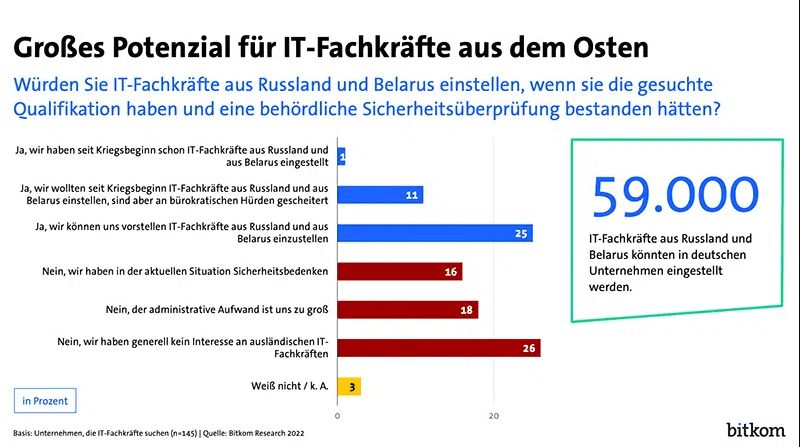AUGUST 28, 2023
The IT skills shortage: a growing problem

The reasons for the shortage of skilled workers are manifold. On the one hand, digitalisation is becoming increasingly important, which leads to an increased demand for IT professionals. On the other hand, many IT professionals are retiring without new professionals coming on board. In addition, many IT graduates do not return to the German economy, but go abroad.
The shortage of skilled IT workers has negative consequences for the German economy. Companies have to pay high wages to find qualified IT professionals. This can lead to an increase in the price of IT services. In addition, companies cannot implement projects as planned because they lack the IT professionals they need.
Sector requirement: promotion and immigration to cope with the shortage of skilled workers
The need for comprehensive measures is not only emphasised by McKinsey & Company. Given the available data and the challenges in the sector, industry associations are pushing for targeted promotion initiatives to be taken by policymakers. These programmes should support the creation of new chairs and study places in the field of natural sciences and information technology in order to train highly qualified graduates.In addition, numerous companies and representatives of the industry are campaigning for a modern immigration law. This law should serve to specifically attract qualified IT professionals from other countries for positions in Germany. At the same time, companies are increasingly expressing concerns about high salary demands and a lack of experience among candidates.
The conflict in Ukraine as a driver for IT expert migration from Belarus and Russia?
With regard to the conflict in Ukraine, the question arises to what extent it serves as a motivator for the migration of IT experts from Russia and Belarus. According to a Bitkom press release in November 2022, 37 percent of the companies surveyed are also open to filling their vacancies in the IT sector with experts from Russia or Belarus. However, this would be on the condition that the persons in question agree to a security check by the authorities beforehand.In 2021, 1,700 IT professionals from Belarus applied for a visa in Germany. In 2022, there are already 11,000. From Ukraine, there are 3,000 visa applications in 2021, in 2022 already 30,000. From Russia, there were 5,000 visa applications in 2021, in 2022 already 50,000. These are only the figures for visas applied for in Germany. The actual number of IT professionals arriving in Germany from these countries is probably even higher.
The increase in the influx of IT professionals from Belarus, Ukraine and Russia is due to the war in Ukraine. Many IT professionals from these countries have fled their home countries due to the war and have applied for asylum in Germany.
The German authorities have taken a number of measures to make it easier for IT professionals from Belarus, Ukraine and Russia to enter and find work in Germany. These measures have contributed to a sharp increase in the number of IT professionals from these countries arriving in Germany in recent years.
Bitkom emphasises that there is considerable potential here. If immigration regulations were eased for these individuals, up to 59,000 vacancies could possibly be filled by qualified professionals from the countries mentioned. Img Source: Bitkom Research
Despite these risks, such as language barriers or cultural differences, there are also many advantages to hiring Eastern European IT specialists. These include:
- Costs: the cost of living in Eastern Europe is lower than in Germany. This means that companies can hire Eastern European IT specialists at a lower price.
- Quality: Eastern Europe has a strong IT industry and many well-trained IT specialists.
- Motivation: Many Eastern European IT specialists are highly motivated and have the desire to work in Germany.
- Commitment: Many Eastern European IT specialists are willing to commit to their work and to perform above average.
There are various measures to counter the shortage of skilled workers in the IT sector. Companies can, for example, train their employees to qualify them for new tasks. In addition, they can train lateral entrants in the IT sector. The federal government has also launched various initiatives to promote skilled IT workers.
Here are some more tips for companies to combat the shortage of skilled IT workers:
- Offer attractive career opportunities and good working conditions.
- Communicate the benefits of a career in IT.
- Work with universities and colleges to train IT professionals.
- Offer continuing education programmes for employees.
- Open your job postings to career changers.
Overall, it can be said that the shortage of skilled IT workers in Germany is an urgent challenge. It is important that companies and the federal government take joint action to address this problem. Eastern European IT specialists offer a promising solution to close the gap between supply and demand.
Sources:
https://de.statista.com/statistik/daten/studie/165928/umfrage/jahresvergleich-der-offenen-stellen-fuer-it-fachkraefte
https://employer.it-talents.de/blog/it-fachkraeftemangel
www.golem.de/news/bewerber-fuer-it-jobs-unzureichend-qualifiziert-zu-wenig-erfahren-oder-zu-teuer-1912-145375.html
https://rp-online.de/nrw/staedte/duesseldorf/stadtteile/rath/das-rueckert-gymnasium-wird-umgebaut-und-it-schule_aid-35691299
www.sueddeutsche.de/wirtschaft/fachkraeftemangel-zuwanderung-ist-noetig-1.3937798
www.tagesspiegel.de/politik/positionen-von-politik-und-wirtschaft-welche-vorstellungen-es-fuer-ein-einwanderungsgesetz-gibt/22881932.html
www.bitkom.org/Presse/Presseinformation/Deutschland-fehlen-137000-IT-Fachkraefte






